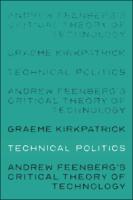Technical politics
Andrew Feenberg’s critical theory of technology
Abstract
This is the first monograph devoted to the work of one of the foremost contemporary advocates of contemporary critical theory, Andrew Feenberg. It focuses on Feenberg’s central concept, technical politics, and explores his suggestion that democratising technology design is key to a strategic understanding of the process of civilisational change. In this way, it presents Feenberg’s intervention as the necessary bridge between various species of critical constructivism and wider visions of the kind of change that are urgently needed to move human society onto a more sustainable footing. The book describes the development of Feenberg’s thought out of the tradition of Marx and Marcuse, and presents critical analyses of his main ideas: the theory of formal bias, technology’s ambivalence, progressive rationalisation, and the theory of primary and secondary instrumentalisation. Technical politics identifies a limitation of Feenberg’s work associated with his attachment to critique, as the opposite pole to a negative kind of rationality (instrumentalism). It concludes by offering a utopian corrective to the theory that can provide a fuller account of the process of willed technological transformation and of the author’s own idea of a technologically authorised socialism.
Keywords
critical theory; philosophy of technology; Marx and Marxism; Adorno; utopiaISBN
9781526105325Publisher
Manchester University PressPublisher website
https://manchesteruniversitypress.co.uk/Publication date and place
Manchester, 2020Classification
Social and political philosophy
Cultural studies
Media studies
Social theory


 Download
Download Web Shop
Web Shop